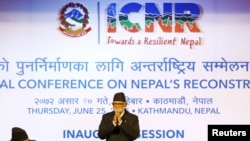International donors and multilateral agencies have pledged about $3 billion in aid to help rebuild Nepal as it struggles to recover from a devastating earthquake. The Himalayan nation got the largest pledges from its two giant neighbors, India and China.
Hailing Nepal’s steely determination and indomitable spirit, India’s foreign minister Sushma Swaraj announced $ 1 billion assistance to the country.
It was the largest pledge made at an International Donors Conference hosted Thursday by Kathmandu.
“Every challenge is an opportunity friends, out of adversity comes strength. Without doubt, from the debris of destruction a stronger, united and more confident Nepal will arise,” said Sushma Swaraj.
Chinese Foreign Minister Wang Yi pledged about half the sum promised by India — $ 483 million. He said his country is committed to sustainable development of the Himalayan nation.
Both India and China have been competing for influence in Nepal and were the first to rush in rescue teams after the nation was hit by the massive earthquake two months ago.
Japan pledged $ 260 million, the United States $ 130 million, and the European Union another $ 100 million. Agencies such as the World Bank and the Asian Development Bank have announced aid of $ 500 million and $ 600 million respectively.
The total amount pledged by various donors is less than the $ 6.7 billion that Nepal estimates it will need to recover from the massive earthquake that killed over 8,800 people. More than half a million homes and buildings were flattened or damaged while lost incomes in the tourist-dependent nation have pushed an estimated 700,000 people into poverty.
Efficient use of pledges
But even as the international community promised billions of dollars, concerns were voiced whether the money will be utilized efficiently by a country dogged for years by political instability, corruption and massive bureaucratic delays.
That concern was underlined by World Bank president Jim Yong Kim, who said in a video message, “It’s not just about money… just as important is how these funds are spent.”
The Nepalese prime minister, Sushil Koirala, tried to ally such fears as he addressed delegates. He vowed “zero tolerance” to corruption and said that the government will leave no stone unturned to ensure that the aid reaches the intended beneficiaries.
But in a country where mistrust of the political leaders runs deep, such assurances did not carry much conviction. Publisher-editor of the weekly Nepali Times newspaper, Kunda Dixit, says the government is under the spotlight for lack of accountability.
“The record in the past month or so has been that a lot of the aid has been obstructed, blocked or sent to party strongholds, some even sold. It’s not happening across the board, but there is enough of that happening for a lot of leakage and wastage to take place,” said Dixit.
Other commentators in Kathmandu such as Yubaraj Ghimire echo those fears. He points out that there have been no elections for local bodies for over 17 years.
“In absence of the local bodies, you know, whether there will be good, effective monitoring at the grass root level, these are apprehensions, this is an issue the government will be judged by,” said Ghimire.
At the same time, aid officials also called on donors to follow-up on their pledges with concrete action. They pointed to Haiti’s example, where donors pledged billions of dollars following an earthquake in 2010, but dragged their feet in actually implementing projects.




